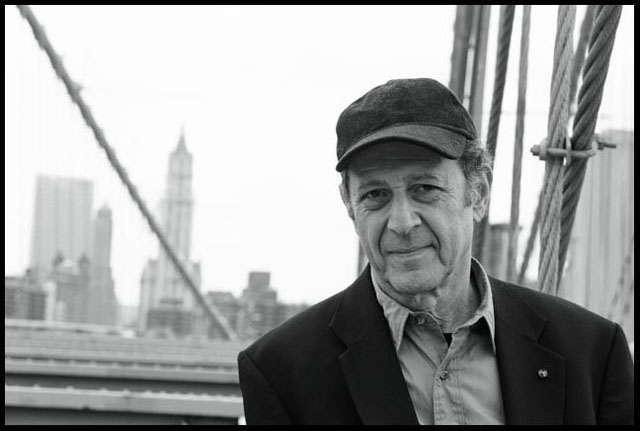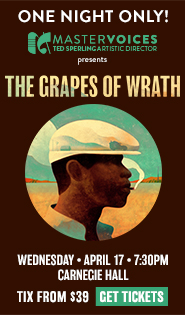“Pulse” premiere shines brightly at Steve Reich’s Carnegie birthday bash

Steve Reich’s 80th birthday was marked Tuesday night at Carnegie Hall with a concert that included the world premiere of Reich’s “Pulse.”
There’s no question about the greatness and importance of Steve Reich’s music, with an extensive body of work that reaches beyond his well-known and influential masterpieces Drumming and Music for 18 Musicians. That his compositional style and ideas have been constantly developing and even changing since the mid–1970s is a further testament of his preeminence.
Reich turned 80 on October 3, and concert halls across New York have been celebrating. Monday night was Carnegie Hall’s turn with an 80th birthday concert, and the event included the world premiere of Pulse, a work the hall co-commissioned and that Reich completed last year. With the combined forces of ICE, So Percussion, Synergy Vocals, and conductor David Robertson, the program was filled out with another recent work, Quartet, and Three Tales, an ambitious composition from Reich’s middle period.
Reich’s continued productivity is a boon for every music lover, and that the music of the last decade or so has been creatively restless. He has explored increasingly complex harmonic and rhythmic structures and a more exacting sense of form than his earlier process music, and Quartet and Pulse offer even more new ideas and sounds.
Quartet is for the prototypical Reich ensemble of two pianos and two percussionists playing metallaphones, achieving that pure Reichian sound. The piece (which had its American debut in Zankel Hall in 2014), ups the ante on harmonic complexity, with frequent modulation from one key to another, and an episodic structure altogether different than the composer’s usual constant flow.
As different as it sounded, Quartet was also unmistakably Reich. He has said again and again that he wants his music to reconcile Bach, Stravinsky, African drumming, and jazz, and in this performance Quartet sounded like jazz. The piece shifted from one set of materials to another in a larger whole, like Charles Mingus’ music, and there was even the rarity for Reich, solo instrumental lines, played by the percussionists.
The three movement, fast-slow-fast form was also familiar from the composer’s career, but the identifiable melodic phrases, and the modulatory motion that stuck in the memory, gave the piece the unmistakable flavor of sonata form. The final movement repeated material from the first, and that set the intervening harmonies into the context of a journey, a destabilizing sequence that made the return of familiar phrases seem a vision of home.
The ensemble was a combination of ICE and So Percussion; pianists Cory Smythe and Jacob Greenberg, and percussionists Nathan Davis and Adam Sliwinski. Their playing was razor sharp, the intricate ensemble interplay impeccable, and the ringing sounds of the instruments beautiful, although Carnegie’s resonance brought the vibes forward and pushed the pianos to what sounded like a deeply recessive distance.
Beauty is a consistent quality of Reich’s recent music, and the most beautiful of all has to be Pulse, which was simple and luminous. Pulse uses a minimum of ideas, although each had a feeling of lushness, and the scoring for a chamber orchestra of strings, woodwinds, percussion, and piano gave it a big, colorful sound.
At the bottom of Pulse was a constant eighth-note throb from an electric bass (impressively steady playing for the sixteen-minute duration by Greg Chudzik) through shifting meters. On top, there was a marvelous long-limbed, lyrical melody, repeated at times in tutti, at others in a closely mirrored canon. That was it, but those elements were so gorgeous together and performed with such warm and deep feeling from ICE and Robertson, that the experience was of yet another great work.
Reich’s greatness can withstand Three Tales, which is his weakest work and a strange choice for the event. One of two video operas he has made in collaboration with his wife, Beryl Korot, it pales in comparison to the previous, The Cave.
The Cave is a dramatic, humane search for the possible meanings of Abraham across religions and cultures. It is overly generous to ascribe drama to Three Tales, which is not actually an opera but instead a video lecture accompanied by music. And the lecture doesn’t work.
Reich means to stand athwart history and warn of the dangers of technology, which was a cliché when the full work was finished in 2002. His three case studies are comprised of the overstated—the Hindenburg disaster—the obvious—the atmospheric nuclear test at the Bikini Atoll—and the now dated and generally forgotten cloning of a sheep to produce Dolly. Three Tales combines a knowing attitude (one scene is titled “Nibelung Zeppelin”) with sophomoric thinking, which falls apart in the rambling, incoherent final act, named after Dolly. There the narrative interviews with scientists like Marvin Minsky and Richard Dawkins begin with cloning and then touch on the Singularity, the loony dream of combining human consciousness with artificial bodies. All are treated with a ridiculously short attention span.
This all might have worked as an earnest, if malformed, jeremiad if the music carried it along. Scored for string quartet, percussion, and vocal ensemble, the accompaniment depends on Reich’s method for generating melody and rhythms out of speech, a la Different Trains. But where his other works transform speech, this one follows dutifully along, repetitive cell after repetitive cell. Aside from an occasional snappy syncopation, the music is dull, and no performance can save it, especially when hampered with a bad mix, as was the case Monday night. Ironically, Reich and Korot’s use of digital technology to create the video and audio and sync it with the live music was expert.
Steve Reich’s Different Trains can be heard in a Three Generations program 7:30 p.m. April 6, 2017. carnegiehall.org



